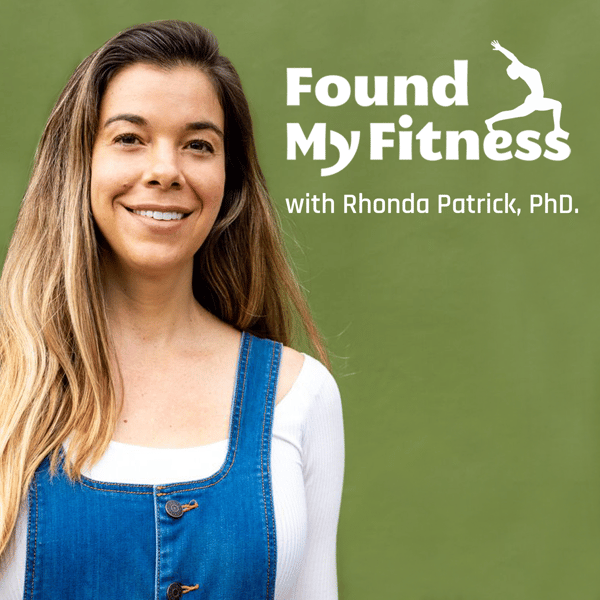#029 Jed Fahey, Sc.D. on Isothiocyanates, the Nrf2 Pathway, Moringa & Sulforaphane Supplementation
FoundMyFitness
Rhonda Patrick, Ph.D.
4.8 • 5.5K Ratings
🗓️ 6 January 2017
⏱️ 152 minutes
🧾️ Download transcript
Summary
Dr. Jed Fahey is a multi-decade veteran of isothiocyanate research and is the director of the Cullman Chemoprotection Center at Johns Hopkins University.
In this episode, you'll discover:
- (00:00) Introduction
- (03:44) What is sulforaphane?
- (10:25) The NRF2 pathway, a master regulator of antioxidants
- (14:22) Cruciferous vegetables are rich sources of sulforaphane
- (20:39) Does cooking broccoli destroy sulforaphane?
- (26:00) Sulforaphane supplements vary widely in quality
- (36:41) Antibiotics wipe out sulforaphane-producing bacteria in the gut
- (46:44) Managing Helicobacter pylori growth with a sulforaphane-rich diet
- (56:15) Sulforaphane reduces inflammation, but does it extend lifespan?
- (01:11:31) The therapeutic potential of sulforaphane for autism spectrum disorders, Alzheimer's disease, and schizophrenia
- (01:22:44) Research challenges and clinical trials
- (01:30:51) Is sulforaphane an anti-depressant?
- 01:34:50 - Moringin from moringa may be an alternative to sulforaphane with similar bioaction
- (01:53:55) How to maximize sulforaphane conversion
- (02:13:27) Testing the anticancer power of sulforaphane
If you’re interested in learning more, you can read the full show notes here.
Join over 300,000 people and get the latest distilled information straight to your inbox weekly: https://www.foundmyfitness.com/newsletter
Become a FoundMyFitness premium member to get access to exclusive episodes, emails, live Q+A’s with Rhonda and more: https://www.foundmyfitness.com/crowdsponsor
Transcript
Click on a timestamp to play from that location
| 0:00.0 | Hello again. In my last podcast, I talked about the effects of a group of compounds known as |
| 0:04.7 | isothiosinates that are produced by the Brasica family of vegetables, including broccoli, |
| 0:09.9 | kale, califlower, and so many others. In the podcast, which actually centered around one |
| 0:14.9 | particularly well-researched isothiosinate known as sulfurophane, was over 45 minutes long. |
| 0:20.9 | I talked about so much in the context of these plants and compounds, including changes in cancer |
| 0:26.0 | risk in humans, reductions in inflammation, causing significant detoxification of air pollutants, |
| 0:31.8 | animal and human studies, and various neurological disorders, such as autism, schizophrenia, |
| 0:36.5 | Alzheimer's disease, traumatic brain injury, and more. I talked about changes in animal models for |
| 0:42.2 | stress-induced depression, talked about heart disease and all-cause mortality and aging in general, |
| 0:47.6 | and also about DNA damage. This is exactly why we're going back in for round two today. This time, |
| 0:54.4 | however, I bring in someone fresh into the discussion, someone that is actually an authority on |
| 0:59.1 | this research. Today's guest is Dr. Jed Fahee, a multi-decade veteran in this field of research and |
| 1:05.5 | director of the Coleman Keema Protection Center at Johns Hopkins. As you'll quickly learn from |
| 1:11.1 | listening to this interview, Dr. Fahee has for many years been at the center, along with his |
| 1:16.6 | colleagues, of a whirlwind of this type of research. There is hardly a topic in which we discuss, |
| 1:22.4 | in which he doesn't have an anecdote about a study he was involved in, or in some cases, |
| 1:27.0 | interesting tribal knowledge that may not even be published, but is nonetheless interesting and |
| 1:31.6 | an important part of the story that is unique to his particular vantage point. His lab and those |
| 1:36.7 | of his colleagues in a way have served as a critical infrastructure for the rest of the research |
| 1:41.9 | community, often helping to facilitate a broad range of studies to get the access they need |
| 1:47.3 | to broccoli extracts and much more. This becomes especially impactful when you realize in 2016 |
| 1:53.7 | alone there were over 150 new studies that were published on this extremely promising |
... |
Please login to see the full transcript.
Disclaimer: The podcast and artwork embedded on this page are from Rhonda Patrick, Ph.D., and are the property of its owner and not affiliated with or endorsed by Tapesearch.
Generated transcripts are the property of Rhonda Patrick, Ph.D. and are distributed freely under the Fair Use doctrine. Transcripts generated by Tapesearch are not guaranteed to be accurate.
Copyright © Tapesearch 2025.

